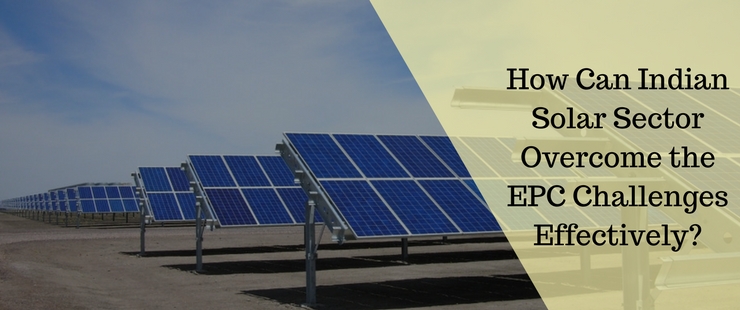How Indian Solar Sector Can Overcome the EPC Challenges Effectively?
With new projects, plans and policies, Solar EPC providers in India seems to have scaled a significant height in the solar energy sector. The future, evidently, seems brighter. Promoting private players by incentivizing and bringing them in, the Indian government has done an admirable job to encourage the green energy revolution through solar energy. The Indian solar industry has reached approximately 16.6 GW solar capacity. By the simple law of nature, opportunities do bring challenges. Solar EPC services in India is one such area that has been facing challenges. Let us discuss what these challenges are, and how they can be overcome in an effective way.
Solar EPC Challenges
1. Bureaucratic Hurdles
The ill fame of the Indian Government when it comes to decision-making is one of the biggest challenges causing delays in the construction and in reaching the completion time line of the solar projects. In a policy driven solar market, advancements and enhancements are achieved with government’s assistance—both in financial terms and in terms of approvals and clearances. However, instability and uncertainty on the part of our government sector has left a bad impression on solar as an unreliable power sector.
Solution: Policies made must be clear enough and the funds allocated must be directed to the right parties. Adopting policy driven solar business with better mechanism by the government can overcome the bureaucratic hurdle considerably.
2. Land Acquisition
Land is an important requisite for solar installation. Not only in terms of space, but also soil geology and topography. Considering the fact that to install 1 MW of solar plant, more than 5 acres of land is required, it becomes obvious that acquiring land is the foremost concern of the EPC service providers. If we take a closer look, there are other issues related to land acquisition, like making the cost agreement. A large piece of land is usually divided amongst several members of a large family. Getting an agreement thus takes time which further delays the solar project.
Solution: Solar parks offered by the government utilize purchased and prepared land ideal for solar installations. Certain states like Karnataka, Rajasthan, Andhra Pradesh have policies in place to simplify land acquisition. Every state in India must incorporate such policies.
3. Logistics & Supply Chain Challenges
The spot for medium to larger solar installations are the lands far away from the madding crowd! That is, areas far away from the residential or commercial places. In a country like India, where transportation in rural areas pose a significant barrier, logistics and supply chain poses a major challenge to get the equipment safely to the right place. Insuring the equipment is a way out but it increases the cost affecting financial and construction plans.
Solution: There must be a 2-way effort. First, the government must ensure better roads, especially in the rural areas. Second, awareness to improve upon the skills necessary in safely handling the EPC equipment must also be ensured.
4. Engineering Challenges
A solar plant is developed stage wise taking into consideration factors such as availability of resources, geotechnical reports and ambient conditions. Much before the actual work begins in the plant, the conceptualization is perceived and prepared by the design engineers at their desk. Formidable plans ensure the EPC success by optimizing the engineering designs. Unfortunately, the Indian Government lacks the necessary information and activities like maintaining stability of the installations, levelling the field, protecting against wind load, minimizing repairing cost are rendered poorly.
Solution: Not all projects are the same. Each one may require new rational and fresh approaches, at engineering as well as operational fronts. A tailor made innovative structural design solution following the site topography can make the project financially viable and help to preserve the environmental landscape.
Conclusion:
The acceptance of solar energy all over the world has positive implications for the environment. A country like India that receives sunshine in abundance has every aspect in its favor which can be conducive to the growth of solar energy. With better cooperation from the utility, feasible interconnected processes, and support from the government by enforcing policy implementations can all together help EPC sector overcome the challenges and grow prosperously making India march phenomenally on the path to solar progress.
SaveGeo Energy Pvt. Ltd. is a rapidly growing solar EPC solutions provider powering residential, commercial, and industrial infrastructure with clean solar energy. Keeping into consideration the quality aspect of each process and activity, we strive to combat and overcome the challenges that customers face. Realizing your dreams of going solar is of utmost value to us and we ensure a long, prosperous life for your solar plant.



